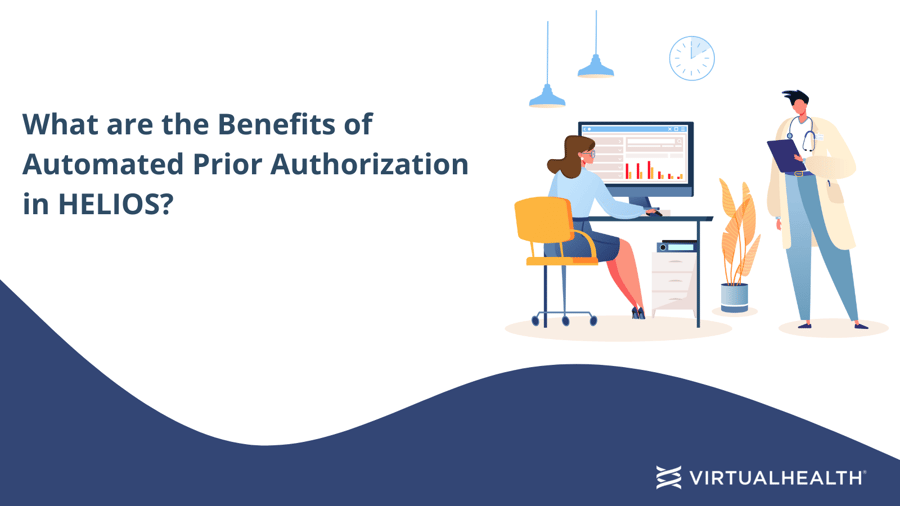Expedite Patient Care and Reduce the Burden Between Payers and Providers with Edifecs Automated Prior Authorization Solution
Prior authorization has long been a burden across the healthcare industry, impacting payers, providers, and patients alike. Although a well-intended tool for utilization management (UM), prior authorization has often come under fire for creating extra red tape, resulting in friction between healthcare payers and providers as well as delays in patient care.
For years, clinicians have decried the prior authorization process as burdensome and inefficient, with physicians and their staff spending as many as 13 hours per ordering physician per week on request, according to a 2021 AMA survey. In many cases, prior authorization processes are either manual or only partially automated, which means providers are still tied to faxes and extensive games of phone tag with payers when attempting to secure approval for their patient’s care.
To help solve this, VirtualHealth and Edifecs, Inc., a global health information technology solutions company, recently announced a new partnership in which Edifecs will provide automated prior authorization to HELIOS users, enabling the prior authorization process within the HELIOS platform versus users having to manage multiple platforms to complete the work.
And this is good news for Medicare Advantage payers considering the new standards required per the recently passed Improving Seniors’ Timely Access to Care Act. This new law mandates that Medicare Advantage plan payers implement an electronic prior authorization solution to streamline approval processes and timelines.
Quickly Understanding the Improving Seniors’ Timely Access to Care Act
To comply with new prior authorization standards, Medicare Advantage payers must establish a prior authorization program that
- Can provide real-time decisions in response to requests for routinely approved items and services
- Accelerate prior authorization decisions for all other covered services
- Provide greater transparency into prior authorization processes by annually sharing specified prior authorization information as set by the Centers for Medicaid & Medicare Services (CMS)
- Meet other CMS standards relating to quality and timeliness of prior authorization determinations
Some payers may also be required to provide specific reasoning when denying requests, publicly report certain prior authorization metrics, and send decisions within 72 hours for expedited requests and seven calendar days for standard requests.
This new legislation is an important step toward expediting patient care and alleviating some administrative burdens around utilization management.
What Edifecs Automated Prior Authorization Will Do in HELIOS
Built on its own interoperability platform, the Edifecs prior authorization solution leverages direct EHR integration, artificial intelligence, natural language processing, and industry standards such as FHIR® (Fast Healthcare Interoperability Resources). It also complies with existing state, federal, and all CMS prior authorization regulations and will automatically adhere to future regulations
Some of the benefits Edifecs Automated Prior Authorization solution will provide within HELIOS include:
- Instant delivery of authorizations via automated decisions based on the payer’s medical guidelines digitized by the Edifecs Prior Authorization platform
- Drive payer and provider collaboration, operational efficiencies, and cost savings with automated electronic health record (EHR) integration and data retrieval
- Provide real-time prior authorization adjudication to enable more accurate billing, fewer claim denials, and faster reimbursement
Help decrease the administrative burden on healthcare providers
Why is Automated Prior Authorization Important?
Prior authorization is intended to ensure that healthcare plan members receive the most appropriate medical services and treatment in a timely manner, and help to guard against unnecessary interventions and keep costs down. When prior authorization is not properly addressed, members may not get the healthcare they need, health outcomes may suffer, and healthcare plans could make the wrong decisions.
Even more alarmingly, manual and inefficient prior authorization processes can be detrimental to health outcomes. An American Medical Association survey found that 91% of physicians reported prior authorization as having a significant negative impact on clinical outcomes. It also found:
- 93% of physicians reported delays in patient care due to prior authorization
- 82% of physicians said that prior authorization sometimes caused patients to abandon recommended treatment
- 34% of physicians said prior authorization has led to a serious adverse event
And a 2022 HHS report found that Medicare Advantage plans inappropriately denied 13% of prior authorization requests for covered healthcare services. Advanced imaging and stays in post-acute care settings are common examples of inappropriately denied services, according to the report.
HHS found three major causes behind inappropriate denials:
- Use of Medicare Advantage organization clinical criteria that are not contained in Medicare coverage rules
- Requests for unnecessary documentation
- Manual review errors and system errors
These are all pitfalls that can be avoided by automating prior authorization processes and aligning both treatment choices and authorization decisions with evidence-based clinical guidelines.
A Closing Consideration: Aligning Utilization Management with Care Management
As healthcare organizations look to invest in technology to digitize prior authorization, they also must consider the value in aligning utilization management with care management teams.
In addition to improving care and experiences for members, leveraging a single software solution could help alleviate burnout and stress for utilization management staff, care teams, and providers.
Read our recent blog to learn more: Why Should Healthcare Payers Consider Integrated Utilization Management Technology?


